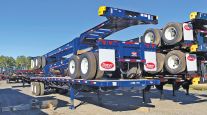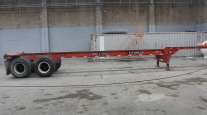Fleets Find More Options to Use Intermodal Chassis
This story appears in the Jan. 10 print edition of Transport Topics.
More equipment options are unfolding for truckers as they take on additional responsibility for chassis formerly supplied by ocean carriers.
Among the new entries are three different truck-oriented chassis rental programs from Flexi-Van Leasing Inc., Kenilworth, N.J., which compete with leasing programs by Trac Leasing Inc., and largest ocean carrier Maersk Inc.’s Direct Chassis Link.
Denmark-based Maersk began the shift away from the ocean carrier industry’s U.S. practice of offering chassis at no charge to truckers in August 2009 by charging a daily use fee through its Direct Chassis Link unit.
Other major ocean carriers such as France’s CMA-CGM said in 2010 they’d stop offering chassis to truckers without offering alternatives such as Direct Chassis Link.
“We are really gearing our business toward motor and carriers as well as the beneficial owners of the cargo [shippers] who are the ones paying the bills,” John Mizerek, Flexi-Van’s vice president of sales, told Transport Topics on Jan. 4. “We realized we had to change. We have been leasing chassis by the hundreds or thousands to the [ocean] lines for many years.”
Curtis Whalen, executive director of American Trucking Associations’ Intermodal Motor Carriers Conference, said he believes chassis rental programs for truckers will survive as the shift continues.
Other choices, such as chassis ownership, have drawbacks such as upfront and financing costs for truckers that own less than 5% of U.S. chassis.
“The process of supplying chassis is changing hands [from ocean to motor carriers], but not in any set way,” Whalen told TT. “It is still a gray area. The clear part is that the ocean carriers will get out of the chassis business.”
Flexi-Van’s daily rental plan is called Flexi-Day; it mirrors Direct Chassis Link and Trac Intermodal’s Trac Connect, which allow truckers to rent a chassis for a calendar day with the equipment provider retaining responsibility for maintenance and repair.
Trac Connect also offers longer-term leases.
Mizerek said the Flexi-Day program has received “very good acceptance” from motor carriers, without giving details.
“We’ve had very good feedback that the program is user friendly,” Mizerek said, in part because of its Internet signup options.
Flexi-Van also has a monthly lease program, which offers discounts based on the number of chassis leased, Mizerek said. Under that program, the trucker is responsible for providing maintenance, such as tires, brakes and lights.
Until a 2005 federal law made the provider of the chassis responsible for its condition, maintenance of that equipment was a sore point for truckers who were forced to pay the cost of fixing chassis that ocean carriers gave them. At the outset, the equipment cost burden was meant to fall on ocean carriers or lessors that provided about 90% of chassis.
Now, as truckers begin to lease chassis on their own, they are assuming legal responsibility for maintenance.
Flexi-Van’s third program offers a lease of a specified number of containers on a monthly basis from chassis pools such as several operated by Consolidated Chassis Management Inc., or CCM.
CCM is an affiliate of the Ocean Carrier Equipment Management Association, whose members include nearly 20 ocean carriers that contribute chassis to the pools.
CCM pool chassis are still offered at no cost to truckers.
However, that approach may be changing.
“CCM has not officially transitioned any of its pool locations to accommodate a trucker model,” said Mike Mitchell, who directs chassis pool development for the group. “Options to facilitate those shipping lines who seek to pursue such alternatives are likely to be presented sometime this year.”
Mizerek stressed the importance of maintaining competition and a choice of options for truckers as the responsibility for chassis increasingly shifts to motor carriers.
“We’ve really tried to get that message and our products out there,” he told TT.
Whalen highlighted another concern — the potential for chassis shortages later this year.
Whalen said the building of new chassis is being held up this year by a lack of manufacturing capacity.
That parallels the 2010 situation that led to a container shortage when the Chinese companies that make the boxes were shut down during the recession and didn’t resume operations until freight demand surged.




